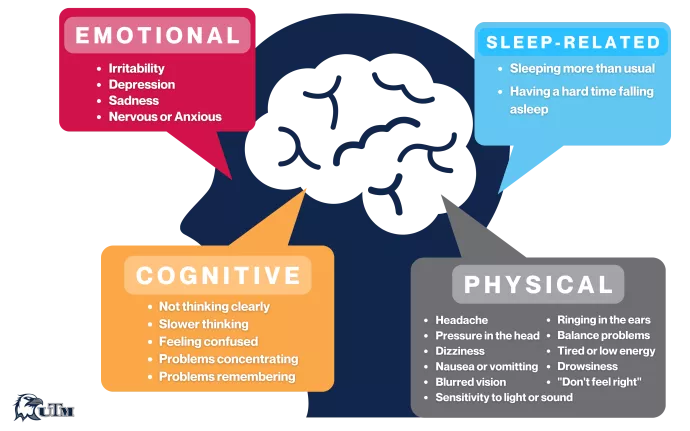
A concussion is a brain injury. It can’t be seen on X-rays, CT scans or MRIs. It may affect the way a person thinks, feels and acts. Any blow to the head, face or neck may cause a concussion. A concussion may also be caused by a blow to the body if the force of the blow causes the brain to move around inside the skull.
A person with a concussion might have one or more of the signs or symptoms listed below. They might show up right away or hours, even days, later. Just one sign or symptom along with a mechanism of injury as listed above is enough to suspect a concussion. Most people with a concussion do not lose consciousness.
Quick Link: UTM Concussion Protocol
Concussions can have a direct impact on participant’s academic, physical, social and emotional functioning. However, with proper management, concussion recovery can be greatly improved!
Signs you may have a concussion

Click image to enlarge picture.
Rowan’s Law & UTM’s Concussion Protocol
As set out in Rowan’s Law, it is a requirement of the Government of Ontario that those participating in organized sport in a post-secondary institution fulfill requirements geared at educating those involved on the signs and symptoms of concussion and the importance of appropriate reporting and recovery.
Those who participate in organized sport activities at UTM are required to fulfill the following:
- Review of one of Ontario’s Concussion Awareness Resources
- Complete the UTM Receipt of Review of Concussion Resources
- Complete the UTM Concussion Code of Conduct
UTM Concussion Protocol
The University of Toronto Mississauga and the Department of Recreation, Athletics & Wellness aims to help students with concussion prevention and management. As part of Rowan’s Law, the Government of Ontario requires post-secondary institutions fulfill certain requirements in the interest of participant safety.
Education on the signs and symptoms along with the causes of concussion is a focal point in the prevention of head injuries. In order to help ensure improved concussion recovery outcomes, the implementation of Removal-from-Sport and Return-to-Sport protocols have also been adopted as per current Rowan’s Law requirements.
Please see the UTM Concussion Protocol along with the following resources and forms:
- UTM Concussion Protocol
- Concussion Information Sheet – Handout for those with a suspected Concussion
- UTM Suspected Concussion & Return-to-Sport Flowchart
- UTM Suspected Concussion Removal-from-Sport Form
- UTM Concussion Return-to-Sport Form
UTM On-Campus Support
If you suspect a concussion, either with yourself and/or a teammate, the first step is to be removed from playing and seek immediate attention. Players should not return to play until cleared by a physician.
U of T Mississauga has many on-campus support services to assist those suffering from a concussion, including academic accomodations:
- Athletic Therapy Centre- Call 905-569-4725, email atchris.kelly@utoronto.ca
- Accessibility Services - Call 905-569-4699, email access.utm@utoronto.ca
-
Health & Counselling Centre - Call 905-828-5255, email health.utm@utoronto.ca
